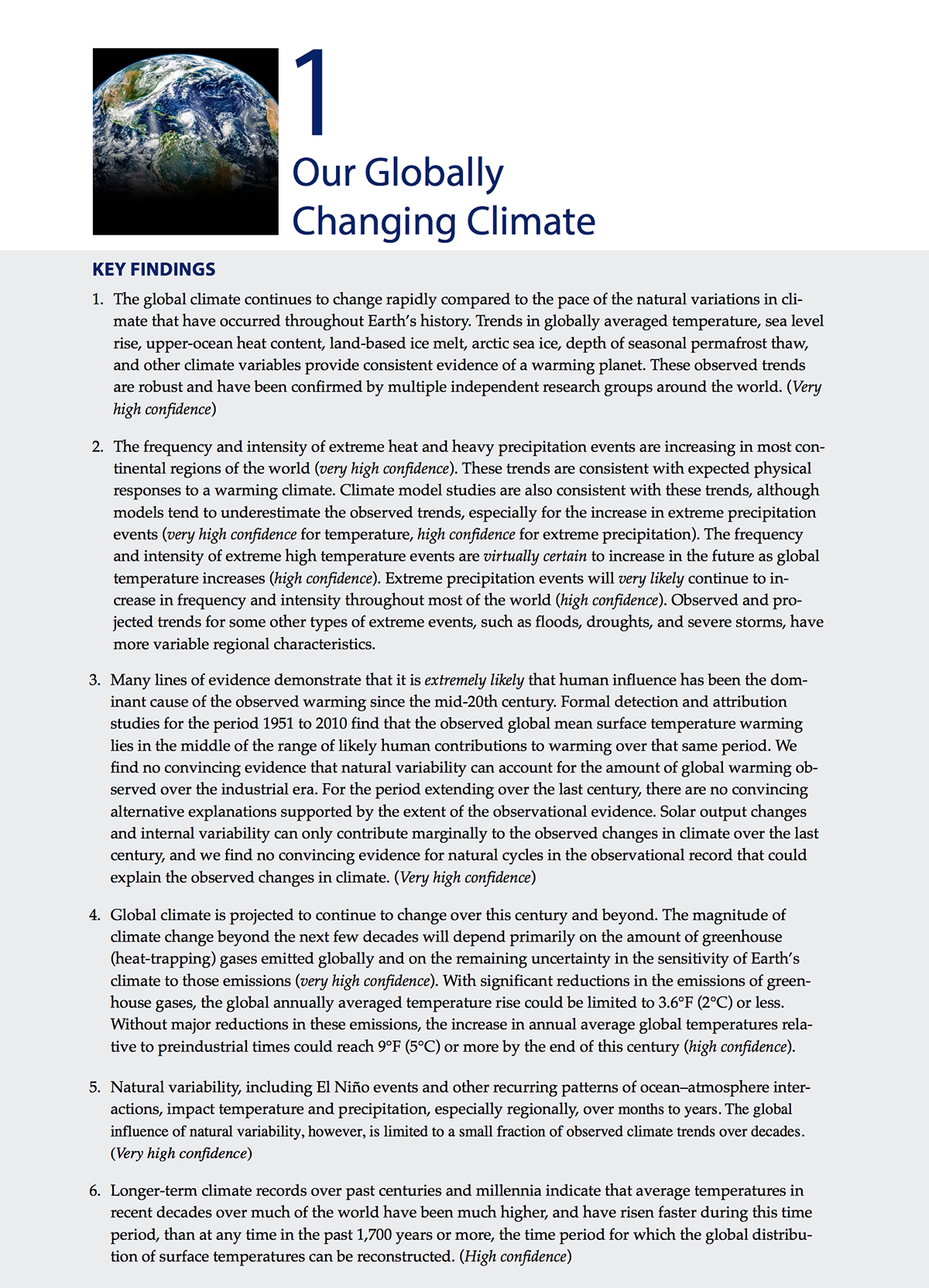Trump’s Agencies to Trump: “No convincing alternative explanation” for climate change but human causes.

“Authoritative report of the physical science of climate change” begs the question: do the president and his agency heads talk to their own scientists?
Last Friday, the U.S. Global Change Research Program issued its Climate Science Special Report [1], in effect a 477-page repudiation of President Donald Trump’s position that climate change is a hoax. The report states (emphasis sic):
This assessment concludes, based on extensive evidence, that it is extremely likely that human activities, especially emissions of greenhouse gases, are the dominant cause of the observed warming since the mid-20th century. For the warming over the last century, there is no convincing alternative explanation supported by the extent of the observational evidence.
By identifying human causes as the only credible reason for increasing climate change since the mid 20th century, the report concurs with the consensus of the climate science community that the planet is warming, and sea level rise and extreme weather events will continue:
Global annually averaged surface air temperature has increased by about 1.8°F (1.0°C) over the last 115 years (1901–2016). This period is now the warmest in the history of modern civilization. The last few years have also seen record-breaking, climate-related weather extremes, and the last three years have been the warmest years on record for the globe. These trends are expected to continue over climate timescales.
The Global Change Research Act of 1990 mandated that the U.S. Global Change Research Program (USGCRP) create “a comprehensive and integrated United States research program which will assist the Nation and the world to understand, assess, predict, and respond to human-induced and natural processes of global change.”
According to the Act, a Committee on Earth and Environmental Sciences composed of representatives of 14 federal agencies[2] must issue an annual assessment that “integrates, evaluates, and interprets the findings of the Program and discusses the scientific uncertainties associated with such findings.” The new report leaves little room for uncertainty, however. In fact, it contradicts, in dramatic fashion, repeated statements by President Donald Trump, and key members of his administration, such as Rick Perry, Scott Pruitt, and Ryan Zinke who regularly deflect or outright deny the issue of climate change. The president’s climate denials are notorious and longstanding.
The concept of global warming was created by and for the Chinese in order to make U.S. manufacturing non-competitive.
— Donald J. Trump (@realDonaldTrump) November 6, 2012
Ironically, the report cites China’s reduced use of coal as a possible reason for a decrease in carbon emissions worldwide (P. 152). President Trump is committed to increasing the use of coal.
The White House allowed the report to be issued last Friday following another bad news week for President Trump. Drafts of agency findings had already been circulating since the Obama administration. A beleaguered White House, focused on tax legislation and the indictments of Trump campaign officials, decided to avoid the uproar that withholding the report would have invited. But Deputy Press Secretary Raj Shah took his best shot at parsing the findings:
The climate has changed and is always changing. As the Climate Science Special Report states, the magnitude of future climate change depends significantly on “remaining uncertainty in the sensitivity of Earth’s climate to [greenhouse gas] emissions.”
Philip Duffy, president of the Woods Hole Research Center and member of the National Academy of Sciences committee that reviewed the report, harshly criticized the administration for its disconnect with its own scientists. He said in an online statement:
This report strongly affirms both the reality of human-caused climate change and the human role in those changes. It also indicates that without strong action severe consequences—including up to 8.5 feet of sea level rise—are possible by 2100… The White House owes the public an explanation as to why their statements and policies are completely at odds with the best available science on climate change.
Key Findings from the Climate Science Special Report follow below.
For the impacts of climate change by region and topic, follow this link.
To read the report by chapter, follow this link.
For a downloadable PDF of the full report, follow this link.

[1]Wuebbles, D.J., D.W. Fahey, K.A. Hibbard, B. DeAngelo, S. Doherty, K. Hayhoe, R. Horton, J.P. Kossin, P.C. Taylor, A.M. Waple, and C.P. Weaver, 2017: Executive summary. In: Climate Science Special Report: Fourth National Climate Assessment, Volume I [Wuebbles, D.J., D.W. Fahey, K.A. Hibbard, D.J. Dokken, B.C. Stewart, and T.K. Maycock (eds.)]. U.S. Global Change Research Program, Washington, DC, USA, pp. 12-34, doi: 10.7930/J0DJ5CTG.
[2] The National Science Foundation, National Aeronautics and Space Administration, National Oceanic and Atmospheric Administration, Environmental Protection Agency, Department of Energy, Department of State, Department of Defense, Department of the Interior, Department of Agriculture, Department of Transportation, Office of Management and Budget, Office of Science and Technology Policy, Council on Environmental Quality, National Institute of Environmental Health Sciences.
